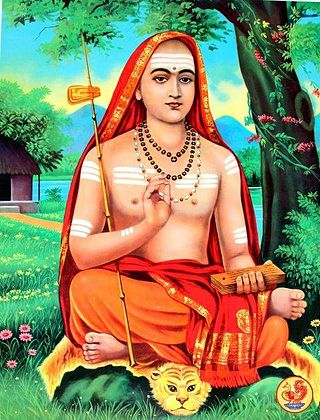Top Qs
Timeline
Chat
Perspective
Dasha Shloki
Sanskrit hymn From Wikipedia, the free encyclopedia
Remove ads
The Dasha Shloki (Sanskrit: दशश्लोकी, romanized: Daśaślokī) is a Sanskrit hymn by the Hindu philosopher Adi Shankara. Comprising ten verses,[1] the Dasha Shloki explores the Brahman-Atman relationship and the author's interpretation of the nature of the self.[2]
Remove ads
Etymology
Description
According to legend, Adi Shankara chanted this hymn in response to his disciples's final request for him, which was to explain the essence of the teachings of Vedanta. He is believed to have first sung the hymn when he met his guru, Govindapada.[4]
In the hymn, Adi Shankara states that the nature of the self is identical to Brahman, which is not identical to the finite and unreal not-self. He also describes the self as that which is one, auspicious, free of attributes and assimilation, and eternal.[5]
Remove ads
Hymn
The first stanza of the hymn describes the author's interpretation of his self as identical to Brahman:[6]
na bhūmirna toyaṃ na tejo na vāyuḥ
na khaṃ nendriyaṃ vā na teṣāṃ samūhaḥ
anaikāntikatvāt suṣuptyekasiddhaḥ
tadeko'vaśiṣṭaḥ śivaḥ kevalo'ham
Neither earth, nor water, nor fire, nor air, nor ether, nor sense-organ, nor their aggregate (am I) because they are inconstant. That which is the one established in sleep, that one which remains (after the sublation of all else) - that auspicious absolute (Self) I am.
— Dasha Shloki, Verse 1
See also
References
Wikiwand - on
Seamless Wikipedia browsing. On steroids.
Remove ads

